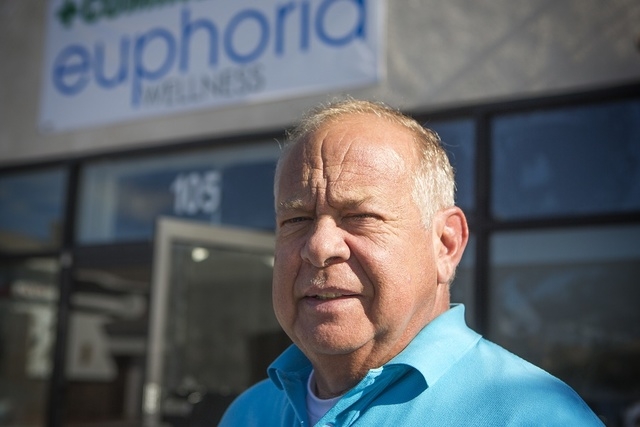Vegas’ medical marijuana industry still shrouded in secrecy

After they applied with the state to open a medical marijuana dispensary, the owners of Euphoria Wellness faced an odd choice: Did they want to keep their name secret from the public?
For them, the answer was easy.
“I have nothing to hide,” co-owner Joe Lamarca said. “I’m going to have a sign out that says ‘Euphoria Wellness.’ I’m not trying to be secretive about it — I’m running a business.”
But others made a different choice, shielded by a state law that keeps much of the information about Nevada’s emerging marijuana industry hidden from the public.
In all, 199 of the 519 applicants for medical marijuana licenses — 38 percent — chose to keep their names confidential, including more than 40 percent of would-be dispensary operators.
The veil of secrecy appears to be an unintended consequence of an old law meant to protect the privacy of patients.
“It’s been a disaster,” said state Sen. Tick Segerblom, D-Las Vegas, who sponsored the 2013 bill to allow marijuana dispensaries.
The secrecy makes it hard to weigh whether political connections played a role in who won licenses.
Some worry about how it will affect the already shaky image of marijuana, which remains illegal under federal law.
“If we really want to bring this industry to the point of public acceptance, then all of our business approaches need to be transparent,” said Shane Terry, CEO of NuVeda, which plans to open two dispensaries.
Segerblom said he plans to introduce a bill this year to make all records of medical marijuana businesses public except for individual confidential tax and financial information.
The bill would be retroactive, Segerblom said, making public almost 200 business names now held confidential under the law.
A brief clause toward the end of the chapter of state law governing medical marijuana says the Division of Public and Behavioral Health “shall maintain the confidentiality of and shall not disclose … the contents of any applications, records or other written documentation that the Division or its designee creates or receives pursuant to the provisions of this chapter.”
The language has been in since 2001, when the Legislature first allowed legal use of marijuana for medicinal use by individuals. That was more than a decade before the state legalized dispensaries, which makes interpreting the patient-oriented confidentiality clause tricky.
Bruce Gale, a lawyer who handles medical marijuana cases, said it could be argued the Legislature never intended to keep information about dispensaries, testing labs or grow facilities secret.
But the attorney general’s office has told state health officials they must enforce the law as written.
“We don’t make the laws; we don’t interpret the laws. We just do our best to implement,” said Pam Graber, a spokeswoman for the state’s Medical Marijuana Program.
So the state has refused to release any information about a marijuana application unless the applicant signs a waiver. Many have done so, but as of last week the state was showing 199 businesses identified only as “CONSENT TO RELEASE NOT PROVIDED.”
HIDDEN IDENTITIES
Even when applicants waive confidentiality, it’s not always easy to see who’s behind a medical marijuana business.
A review of Clark County applications and other records shows that some businesses seeking permits are owned by multiple layers of limited liability corporations, with some of those LLCs registered by lawyers representing clients they don’t have to identify.
In some cases, information initially kept secret ultimately becomes public in another forum. Clark County released records of all 18 dispensaries it approved showing every person with an ownership interest. And after a permit is issued, the business still must get the same local zoning approvals as any other business.
But unless the state law is changed, the public never will know the identity of all those who applied but never made it any further. And that’s just fine with some people.
Jared Kahn, a lawyer for a dispensary applicant that kept its name secret until forced to reveal it in court, said there are legal and security reasons for confidentiality. Dispensary owners elsewhere have been robbed, he said, and the federal law against marijuana makes some people wary.
Kahn’s client, Naturex LLC, remains otherwise unidentified in state documents — even though he publicly identified the company in court and the company later filed a lawsuit challenging Clark County’s application rejection.
Lamarca said he thinks people keeping their names hidden are more worried about their image than security.
The law has led to some absurd scenes, as people try to have a public debate about information that remains secret.
During a December court hearing in a lawsuit challenging the state’s dispensary approval process, one lawyer asked the judge not to take any action yet. He said it was unfair that his client — a state-approved dispensary identified only as a “Doe” — hadn’t had a chance to reply because it had only learned about the lawsuit a day earlier.
Dennis Kennedy, the plaintiffs’ lawyer, seemed somewhat exasperated.
“The Doe defendants were the ones who asked that their identities be kept secret,” he told the judge. “So we can’t be faulted for not knowing who the secret parties were — we did our best.”
Contact Eric Hartley at ehartley@reviewjournal.com or 702-550-9229. Follow @ethartley on Twitter.